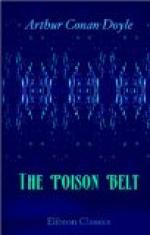“Halloa, young fellah!” says Lord John, staring at me in surprise. “We could do with a joke in these hard times. What was it, then?”
“I was thinking of all the great unsolved questions,” I answer, “the questions that we spent so much labor and thought over. Think of Anglo-German competition, for example—or the Persian Gulf that my old chief was so keen about. Whoever would have guessed, when we fumed and fretted so, how they were to be eventually solved?”
We fall into silence again. I fancy that each of us is thinking of friends that have gone before. Mrs. Challenger is sobbing quietly, and her husband is whispering to her. My mind turns to all the most unlikely people, and I see each of them lying white and rigid as poor Austin does in the yard. There is McArdle, for example, I know exactly where he is, with his face upon his writing desk and his hand on his own telephone, just as I heard him fall. Beaumont, the editor, too—I suppose he is lying upon the blue-and-red Turkey carpet which adorned his sanctum. And the fellows in the reporters’ room—Macdona and Murray and Bond. They had certainly died hard at work on their job, with note-books full of vivid impressions and strange happenings in their hands. I could just imagine how this one would have been packed off to the doctors, and that other to Westminster, and yet a third to St. Paul’s. What glorious rows of head-lines they must have seen as a last vision beautiful, never destined to materialize in printer’s ink! I could see Macdona among the doctors—“Hope in Harley Street”—Mac had always a weakness for alliteration. “Interview with Mr. Soley Wilson.” “Famous Specialist says `Never despair!’” “Our Special Correspondent found the eminent scientist seated upon the roof, whither he had retreated to avoid the crowd of terrified patients who had stormed his dwelling. With a manner which plainly showed his appreciation of the immense gravity of the occasion, the celebrated physician refused to admit that every avenue of hope had been closed.” That’s how Mac would start. Then there was Bond; he would probably do St. Paul’s. He fancied his own literary touch. My word, what a theme for him! “Standing in the little gallery under the dome and looking down upon that packed mass of despairing humanity, groveling at this last instant before a Power which they had so persistently ignored, there rose to my ears from the swaying crowd such a low moan of entreaty and terror, such a shuddering cry for help to the Unknown, that——” and so forth.
Yes, it would be a great end for a reporter, though, like myself, he would die with the treasures still unused. What would Bond not give, poor chap, to see “J. H. B.” at the foot of a column like that?
But what drivel I am writing! It is just an attempt to pass the weary time. Mrs. Challenger has gone to the inner dressing-room, and the Professor says that she is asleep. He is making notes and consulting books at the central table, as calmly as if years of placid work lay before him. He writes with a very noisy quill pen which seems to be screeching scorn at all who disagree with him.




